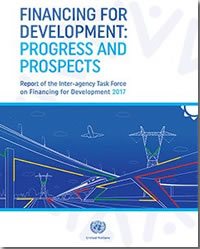The Report of the Inter-agency Task Force on Financing for Development: Progress and Prospects, draws on the expertise, analysis and data from over 50 international institutions, including the World Bank Group, the International Monetary Fund and the World Trade Organisation, as well as UN agencies such as UNCTAD and UNDP.
Despite an expectation for improved growth in 2017, at current global growth, trade and investment rates, the world will not deliver the goal of eradicating extreme poverty by 2030, with the poorest countries falling short by wide margins, a new report warns.
The report further notes that there are high risks and uncertainties over policy stances of major countries, with the balance of risks on the downside.
This flagship United Nations-led assessment draws on the expertise, analysis and data from over 50 international institutions that make up the Inter-agency Task Force on Financing for Development, including the World Bank Group, the International Monetary Fund and the World Trade Organisation, as well as UN agencies such as UNCTAD and UNDP.
The Task Force estimates that, if current growth and distributive trends continue, about 6.5 per cent of the world population will remain poor in 2030.
Mr. António Guterres, the United Nations Secretary-General said “Despite the huge strides in the fight against poverty made possible by globalization and technological progress, inequality has increased markedly around the world. Conflicts are proliferating and other megatrends, such as climate change, food insecurity and water scarcity, are putting the progress of the last few decades at risk. We must act decisively to address these challenges.”
The Task Force finds that national-level actions and international cooperation can change the trajectory of the global economy and launch countries on the right path towards achieving the Sustainable Development Goals (SDGs).
Rather than turn away from multilateral cooperation, the 60 institutions argue that joint international action is as vital as ever. Many of the challenges that countries face, including slow economic growth, climate change and humanitarian crises have cross-border or even global repercussions, and cannot be addressed by any one actor alone.
The agencies argue that increases in long-term and high-quality public and private investments, particularly for infrastructure, will lead to a sustainable rise in economic growth, and can help provide the employment and income opportunities required to make growth more inclusive.
Mr. Wu Hongbo, the United Nations Under-Secretary-General of Economic and Social Affairs said “Ramped-up investment in sustainable infrastructure will help stimulate sustainable and equitable global growth, and make available more resources for investment in achieving sustainable development.”
The inter-agency report argues that the international community must continue providing financial and capacity support to countries most in need, and to tackling social and environmental concerns with cross-border repercussions, such as climate change and humanitarian crises.
The 2017 “Progress and Prospects” report of the Inter-Agency Task Force on Financing for Development is the first joint assessment of the economic situation conducted since the 2030 Agenda was adopted in 2015.
The report also surveys the recent achievements and challenges in the implementation of the Addis Ababa Action Agenda, presenting recommendations for corrective action agreed by all the Task Force agencies.
The Addis Agenda seeks to mobilize public finance, to set appropriate frameworks to unlock private finance, trade opportunities and technological development, ensure debt sustainability and align the international financial, monetary and trading system with economic, social and environmental priorities.



